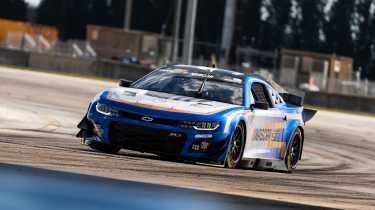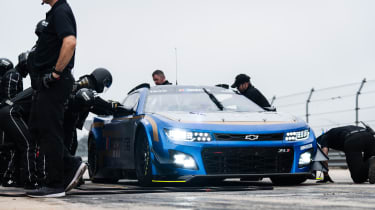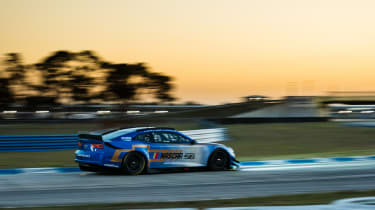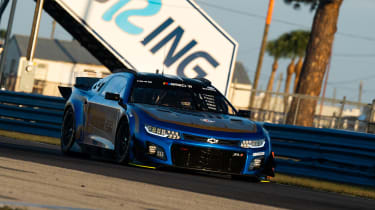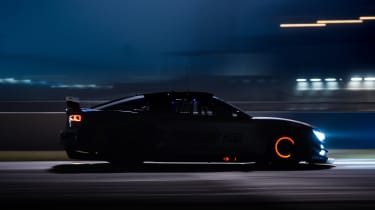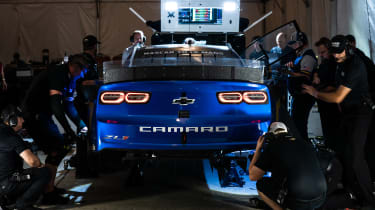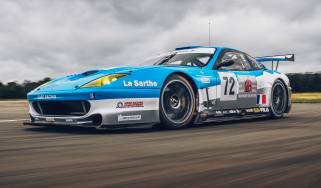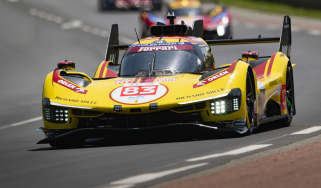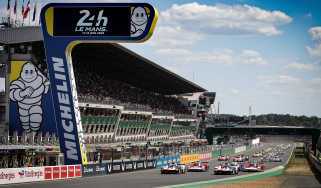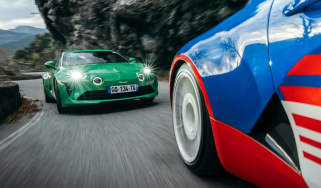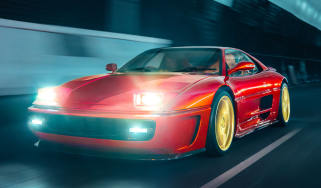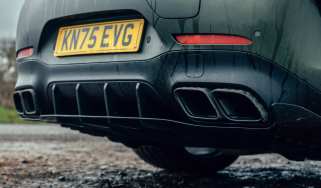NASCAR Cup car takes to Le Mans 2023: behind the scenes of Garage 56
Garage 56 has entered its NASCAR Cup car into this year's 24 Hours of Le Mans, with Jenson Button at the wheel
Everyone has their own version of Le Mans. For some it’s the romance of massive, oil-spitting Bentleys with skinny tyres thundering around the clock in the 1920s, whilst others are stuck in 1971. Steve McQueen’s slate-grey 911S, those 917s and Ferrari 512s… the noise and the crashes. Or maybe you’re a Group C diehard, or remember standing in awe near the Porsche Curves as the Peugeot 908 HDi FAP flew through almost silently but with such aggressive agility it literally took your breath away. Perhaps you just love the GT cars, which may lack the spaceship wonder of a prototype but are much more distinctive in look and sound.
It’s not just the cars, either. It’s where you camp or stay, the corners you like to visit, how you plan your race day (and night) as a spectator. Even the route and the group of people you choose to travel down through France alongside. Le Mans isn’t one event. It’s hundreds of thousands of lived experiences, each one different and each as valid as the next. The very essence of Le Mans is variety. And for this summer’s 100th running of the 24-hour sportscar race, the Garage 56 entry – a special single-class invite for cars demonstrating innovative technology – has truly embraced that spirit.
> FIA Le Mans 24 Hours 2023 – a guide to the year’s biggest endurance race
It’s big, you might argue it’s not clever, but my goodness it’s exciting to have a Chevrolet Camaro ZL1 stock car from the NASCAR Cup series taking up that Garage 56 entry. Yes, it’s true. Alongside the hybrid hypercars, the incredibly nimble and closely contested LMP2 field and the sophisticated GTE cars from Ferrari, Porsche, Corvette and Aston Martin there will be a big, bawdy, badass stock car on the grid.
It’s a serious entry, too. Prepared by Hendrick Motorsports, perhaps the biggest and best outfit in NASCAR, and driven by Jenson Button, Mike Rockenfeller and seven-time NASCAR champion Jimmie Johnson, this is more than just a publicity stunt. They want to mix it with the GTEs, create some new memories for the fans and show that NASCAR really has a fantastic race car on its hands with the new ‘Next Gen’ Cup series machine. We joined them at their first 24-hour test in Sebring, Florida to see (and hear) how this project is progressing.
It’s hard to believe, but up until the 2022 season the NASCAR formula included a four-speed manual gearbox, steering box and live rear axle. This is the second most popular motorsports championship in the world and the most watched series in the US, remember. It’s fair to say the previous generation stock car would not have cut it at Le Mans. However, with the introduction of the Next Gen car for ’22, things radically shifted and aligned more closely with endurance racing championships across the world. The dream of NASCAR being represented at Le Mans suddenly became a possibility…
Engineered in conjunction with Dallara and produced exclusively by Technique Inc, the Next Gen chassis sticks with a steel tubular construction with modular front and rear subframes. The body is composite but NASCAR felt it was important to keep a more traditional chassis due to the ease of repair and to keep costs under control. If you’ve ever seen a multiple-car crash on an oval (which you will have if you’ve even seen one NASCAR race!) you’ll understand the logic. The chassis is a spec part shared by Ford, GM and Toyota. Suspension is by double wishbones at each corner with spec five-way adjustable Öhlins TTR dampers, and AP Racing supplies the braking system. There’s also a standard five-speed lever-operated sequential transaxle with externally adjustable gas-charged positive pre-load differential from Xtrac. Wheels are 18-inch and supplied by BBS, while Goodyear is the sole tyre supplier.
Each manufacturer produces its own engine, of course. There’s no hybrid system (although the Xtrac gearbox was developed with an eye on hybridisation in the future) and plenty of tradition here, too. The sort of tradition we can all support: pushrod-operated naturally aspirated 5.8-litre V8s producing around 670bhp and the capability to rev to around 10,000rpm. A standard Next Gen car weighs around 1495kg (without fuel and driver) and the footprint is around 300mm longer than that of a Porsche 911 RSR-19 (the current mid-engined GTE car), very slightly narrower but with a 254mm longer wheelbase.
Car 24, though, is not a standard Chevrolet Camaro ZL1 stock car. It remains true to the NASCAR Cup series racers in so many ways – for example, drivers will have to slide through the window when they swap as there’s no door structure and the pit crew will still jack the car manually – but there are lots of refinements in the name of aero efficiency, performance, longevity and just the realities of a 24-hour race. So much so that Hendrick Motorsports hope this programme could inform the next steps for the evolution of Next Gen cars.
Weight is cut to 1342kg thanks to a number of changes including new bodywork and carbon brakes supplied by AP Racing. This Camaro is 50mm longer thanks to a Le Mans-specific new front splitter and rear diffuser. There are also dive-planes and a modified version of the flat floor in an effort to increase downforce, the rear spoiler is extended by 50mm and even the rear screen is slightly different. Hendrick really has worked hard to bring the Camaro up to GTE-chasing levels of performance. Even so, the downforce numbers won’t even get close to the likes of Porsche, Ferrari and Corvette, so the engine has also seen gains to ‘somewhere in the high 700s’. If the stock car can’t match the GTE contenders in the corners it should eat them up down the long straights.
The other most notable mechanical change is the switch from lever to paddle operation for the Xtrac gearbox. Oh, plus working front and rear lights! They may come in useful. Goodyear will supply a range of wider and bespoke new slick and wet weather tyres and the increased 120-litre fuel tank will use the WEC and ACO-mandated Total Excellium Racing 100 biofuel. The car is also fitted with an adjustable traction control system. Hendrick Motorsports knows it has a big job on its hands but has clear targets. ‘First, we want to finish,’ says VP of competition Chad Knaus, ‘but ultimately we want to get very close to the GTE cars. And win some new fans.’
NASCAR at Le Mans 1976
This year’s Garage 56 entry won’t be the first time that NASCAR has taken a trip to Le Mans. Back in ’75 the ACO approached Bill France, a force of nature who had run the American series since 1972 and would oversee its incredible rise in prominence until retiring in 2003, to see if there was a way to blast some NASCAR thunder directly in to the 24-hour race. And so, in June ’76, a new ‘Grand International’ class formed a part of the Le Mans grid. There were just two contenders but they made a big impression.
NASCAR was represented by an Olympia beer-sponsored Dodge Charger run by team owner and driver Herschel McGriff with his son Doug, and a wickedly angry-looking Ford Torino under the supervision of privateer Junie Donlavey and driven by Richard Brooks, Dick Hutcherson and Marcel Mignot. Compared to the lengths Hendrick Motorsports are going to in 2023 the preparation was pretty relaxed 47 years ago. Lights, wipers, some radio gear and side mirrors. Plus lower compression engines to account for the lower octane fuel used at Le Mans.
The cars didn’t fare brilliantly in qualifying but were far from a disgrace. The Charger finished 47th (from 57) with a 4.29.7 – nearly a minute shy of the pole-sitting Alpine-Renault A442 Turbo prototype, but only 7 seconds off the fastest Porsche 911 RSR and ahead of CSLs, other RSRs and a Pantera. The Torino was 54th, having set a time of 4.38 flat. Sadly, that poor quality fuel destroyed the Charger’s third and final engine (the others having suffered in practice and qualifying) on lap 2 of the race and the Torino retired in the 11th hour. It was a deflating end to an intriguing footnote in Le Mans history.
The 24-hour test, Sebring Raceway
Tyres and fuel. That’s all Hendrick want to be throwing at a car during a 24-hour test, and the crew have come prepared. Row upon row of fuel drums are lined up at the far end of the viewing structure overlooking the pit straight, while Goodyear seems to have brought enough tyres to supply an entire grid. But this is more than just a durability test. The ZL1 has accrued several thousand test miles already, but here at Sebring the full line-up is in attendance and there’s still so much to do. Fundamental set-up work, evaluation of several new tyre compounds, and there’s plenty of speed to find. For reference, the pole lap in the GTE Pro class in 2022 at Sebring was a 1.57.233.
The test is scheduled to start at 10am, and when we arrive at 8.30 the large awning in the paddock area that acts as garage, control centre and catering facility is buzzing with activity. If you’re used to seeing race cars being prepped on stands with bodywork removed to reveal intricate suspension pushrods and a minimalist carbonfibre structure, the sight of a stock car propped up on two wheels at what must be close to 45 degrees so mechanics and engineers can access various components is a bit of a shock. It does give a great view of the new extended diffuser though, and the huge cooling ducts for the new carbon brakes. The Camaro might not have the alien intrigue of a prototype but it’s clearly beautifully prepared.
Mike Rockenfeller won Le Mans back in 2010 driving an Audi R15 TDi Plus and wrapped up the DTM series in 2013. He knows European racing inside out and also contested a couple of NASCAR rounds in 2022. The Garage 56 entry has been his baby in terms of development and it seems natural that he’s in the car for the first few shakedown laps. Sebring is a punishing place with evil bumps and a highly abrasive concrete surface. It bakes in the day and, at this time of year, gets bitingly cold at night. Hendrick couldn’t have chosen a more challenging circuit for this 24-hour test.
If the team look anxious and ‘Rocky’ is clearly very focused as he rolls out on track, the atmosphere amongst the other drivers is refreshingly relaxed. Jenson Button looks like a kid at Christmas. He’s always a smiley character but I’m not sure I’ve ever seen a bigger grin. Jimmie Johnson isn’t quite so gleeful but has such a calm, considered and content demeanour. I confess, as a European racing snob my knowledge of Jimmie is limited at best and to say he doesn’t adhere to the NASCAR archetype is a huge understatement. Just being within ten feet of him seems to calm me down – and I’m just an observer in the Florida sunshine with nothing to worry about. For the team, his constance must be a wonderful and contagious asset.
Finally, there’s ‘coach’ and reserve driver Jordan Taylor, who has contested and won the GTE Pro class at Le Mans with Corvette, finished 1st overall in the 2017 Daytona 24-hours and is also undoubtedly the funniest man on Twitter (check out his alter ego Rodney Sandstorm). It’s an odd mix but it works, and the drivers seem to travel around the Sebring paddock in a little huddle of laughs and positivity. Yet as each one slides into and then out of the window of the Camaro ZL1, the enormity of what’s ahead seems to weigh a little heavier…
Jenson doesn’t know the track at all and the bumps are clearly a culture shock, but the biggest challenge is how a NASCAR machine is almost diametrically opposed to a single-seater. ‘I’m used to a very lightweight, high-downforce car and this is obviously a really, really heavy car without much downforce at all and it feels totally reliant on mechanical grip. It rolls a lot, there’s momentum, it’s just a different animal. Oh man. The noise. It sounds just as good inside the car.’ He’s smiling, but his eyes show that the Camaro is quite a wild ride. Later I eavesdrop as he chats to the engineers, which feels rude but is enlightening. ‘Oversteer everywhere,’ he begins. ‘Like everywhere. I’m not sure I’ve ever driven a car with less grip. I tried to be as smooth as possible and I just went slower. So you have to bully it and hold on. Basically, when you feel like you’re on the edge of a crash you’re about in the right place.’ The engineers and Goodyear people nod rather solemnly.
However, by my watch, the times aren’t bad. We’re in the full heat of the day and it’s impossible to draw too many conclusions as there are so many tyre iterations to try here, but the car is in the 2.01s, then dips under and I get a couple of 1.59s, too. Rocky is immediately on the pace, as you’d expect, but reports similar things. Endless oversteer. Jimmie is, as ever, a little more relaxed when I catch up with him. ‘I guess from my point of view it’s a stock car, so I know what to expect. This is what they’re like and we have improved it and will continue to do so, but in the end it is still going to be a stock car.’ He shrugs and smiles.
From a spectator’s point of view, you wouldn’t want to change too much. The Camaro bucks and twists over the bumps, the body language of the car is fully energised and you can picture the work-rate of the drivers as it slips and thumps around Sebring. That V8 noise isn’t too much louder than the Porsche RSRs testing simultaneously but the deep, elemental sound travels so much further. You feel it coming from half a lap away. In a world dominated by high-downforce cars that seem to flick effortlessly from one turn to the next, the sheer physicality of the Garage 56 entry is irresistible to behold.
As the sun falls, the other cars that have been testing slip away and the Camaro is alone. I’m staying at a hotel that overlooks the track, and having watched Jenson, Jimmie, Rocky and Jordan out on track, seen the glowing brake discs and the flaming exhaust and pondered whether NASCAR’s version of a race car is inherently in tune with what fans crave wherever in the world they live, I fall asleep to the hypnotic sound of a 5.8-litre V8 being wrung out mercilessly. It makes it through the night and to 10am the next morning. There’s still a long way to go with this programme but NASCAR has got a 24-hour endurance racer on its hands. The 100th running of Le Mans is set to be special for a number of reasons, but seeing this car at maximum speed and feeling the shockwave as it passes might be the most unforgettable experience of them all.

